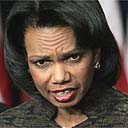The Bush administration today made it clear it was willing to engage in high-level talks with Iran during an international conference on Iraq in Egypt this week.
The US secretary of state, Condoleezza Rice, will attend the event in Sharm el-Sheik, as will the Iranian foreign minister, Manouchehr Mottaki.
Should they meet face to face at the two-day meeting, starting tomorrow, it will be the highest-level contact between the two countries for almost three decades.
The meeting, bringing together officials from the US, Iran, Russia, China, the EU and Arab countries, is to discuss economic aid for Iraq and ways to rein in sectarian strife. But speculation on the possibility of direct substantive talks between the US and Iran has dominated the run-up to the conference.
"The Friday ministerial talks will be an opportunity for us together to work directly for the good of the people of Iraq," the US undersecretary of state for political affairs, Nicolas Burns, told an audience at the Chatham House thinktank in London.
With Mr Bush facing intense Democratic party pressure on funding for the Iraq war, there is now even greater incentive for the US to turn to Iran to help stabilise Iraq.
The third most senior official at the state department, Mr Burns said he hoped Iran would discuss negotiations on the contentious issue of Iran's nuclear enrichment programme, as well as Iraq.
The talks in Egypt, Mr Burns said, "will be important because Secretary Rice will be seated around the table with the Syrian foreign minister and, we hope and think, with the Iranian foreign minister, although the Iranians have been a little bit ambivalent."
Iran has blown hot and cold over such a high-level meeting. There is a debate in Tehran on whether to accommodate a US change of heart.
Mr Mottaki today said Tehran had still not decided whether to accept face-to-face talks with the US. "This case is under review. No final decision has been made yet in this regard," he said.
The comment was much softer than an earlier statement by his own deputy, who claimed the timing was not right for top-level Iran-US talks.
In his remarks, Mr Burns ran through the list of US complaints about Iran. This included Tehran's support to Hizbullah in Lebanon, Hamas in the Israel-Palestinian conflict and Shia extremists in Iraq, and its nuclear programme.
But Mr Burns emphasised America's wish to engage Iran diplomatically.
"There is a choice: confrontation or diplomacy. We prefer diplomacy and we are trying to open two diplomatic channels - on the nuclear issue and on Iraq," Mr Burns said.
The UN security council has imposed sanctions on Iran for its refusal to accept an international package on aid for developing nuclear power for civilian use in exchange for a halt to uranium enrichment. This would be a first step towards acquiring nuclear weapons. Iran faces further sanctions later this year should it persist with enrichment.
Despite its new willingness to talk directly to Iran at a senior level, the US still opposes direct negotiations with Iran on nuclear enrichment, a move advocated by the EU foreign policy chief, Javier Solana, who has been meeting Iranian officials on the issue.
"It is better if the nuclear issue stays in that channel," Ms Rice said.
Mr Burns reiterated in London that the US would not negotiate with Iran on nuclear issues until it agreed to stop enrichment as called for by the security council.
Ms Rice, during a stopover in Ireland, said talks with Iran would focus on Iraq, but she would not cut off a conversation if it turned to Tehran's nuclear programme. "I think I can handle any question that is asked of me," she said. "If we encounter each other and wander to other subjects I am prepared to address them at least in terms of American policy."
